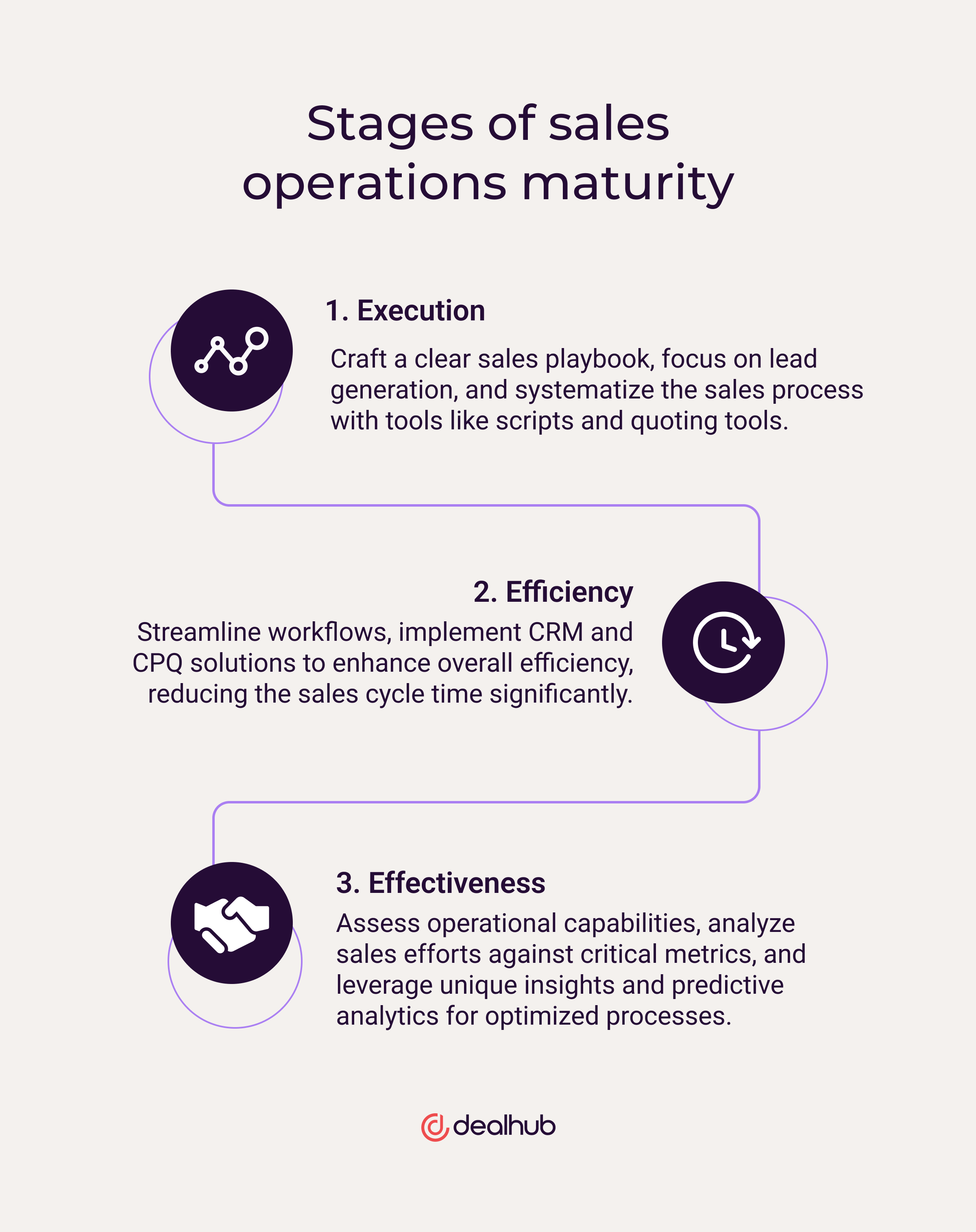Many organizations repeat the same sales processes in greater volume as they grow, simply going from one rep making calls to many. Without moving toward greater sales operations maturity, an organization can never evolve, handcuffing its potential to enter more competitive markets and explore new corporate horizons.
As the organization grows, so does its sales operations
When we think of operational maturity in business, we’re referring to the effectiveness, efficiency, and sustainability an organization achieves in its day-to-day operations. Operational maturity reflects how well a company can execute its processes, deliver products or services, and adapt to environmental changes. Operational maturity is assessed through the lens of people, processes, technology, customer experience, and leadership.
We can use this same lens to evaluate the maturity of an organization’s sales operations.
Sales operations’ role is to ensure the organization’s tools, processes, and effectiveness mature as the team grows. In my experience, sales organizations go through three stages of sales operations maturity. In each stage, management concerns evolve; therefore, technology investment priorities, processes, and training must also change.
Whether you have one sales rep or 100 or have been around for one year or 20, it is vital to regularly take stock of where your organization falls on the maturity scale and seek out opportunities for improvement. I promise you that there are always improvements to be made.
The 3 stages of sales operations maturity

1. Execution
In your organization’s early stages, you should concentrate on putting together a clear sales playbook and ensuring your team executes it. Most companies need a clearly defined way to maximize sales. This is where sales operations can help.
When developing a plan, it’s crucial to cover every stage, from lead generation to managing prospects through the pipeline, with minimal leakage. Sales managers should arm their salespeople with scripts, proposal templates, and quoting tools to systematize and standardize the sales process.
2. Efficiency
Once the execution aspects of the sales process are clearly defined, sales managers need to streamline how to implement the plan. Is your sales organization efficient if your salespeople are executing your sales plan flawlessly but spending an average of 20% of their time selling and the remaining time on administrative tasks?
This is the stage of sales maturity where companies implement sales enablement tools such as CRM and CPQ solutions to improve efficiency and streamline workflows. For example, organizations that use Configure Price Quote software see an average sales cycle of 3.42 months, over a month shorter than non-CPQ users at 4.68 months.
3. Effectiveness
When you reach the final stage of maturity, your sales team executes your sales process with peak efficiency and effectiveness. Sales leaders at this stage can assess the current operational capabilities and processes to identify where improvements can result in greater returns. They carefully analyze the efforts of your sales organization and compare them against critical metrics.
Which reps are closing the most sales? What techniques are they using? What software, content, or processes can help your entire team sell like that?
To fully understand the effectiveness of your sales process, you need unique insights and predictive analytics. With customer-driven data, you can identify the areas in your process that need to be optimized.Here again, sales enablement technology can help guide your reps to the most effective sales paths. For example, a CPQ solution with analytics can show your salespeople the next best action to take or the correct discount to offer to increase the probability of a sales win.
Growing a fully developed sales operations strategy
Improving sales operations execution, efficiency, and effectiveness is crucial for organizations to enhance sales performance and drive revenue growth. Consider these strategies to grow into a fully mature sales operations team.
1. Define clear sales processes: Start by documenting and communicating standardized sales processes to ensure consistency across the sales team. It’s essential to map out clearly defined steps from lead generation to closing the deal. Minimize administrative burdens on the sales team by automating routine tasks and paperwork.
2. Implement a Customer Relationship Management (CRM) system: A CRM system is the foundation of mature sales operations. Utilize it to track customer interactions, manage leads, and monitor the sales pipeline. To reduce time to value in your CRM, ensure that it’s user-friendly and integrates seamlessly with other tools used by the sales team.
3. Provide sales training: Enable your salespeople to perform at peak effectiveness by investing in ongoing training to enhance their product knowledge, sales skills, and understanding of the sales processes. Include training on using sales tools and technologies effectively, as well.
4. Set realistic targets: Sales operations leaders must establish achievable and measurable sales targets for individual sales professionals and the team as a whole. Regularly review and adjust targets based on market conditions and business objectives.
5. Implement sales analytics: Use data analytics to gain insights into sales performance, customer behavior, and market trends. Use leaderboards to provide transparency into sales metrics and performance. Leverage analytics to identify areas for improvement and optimize sales strategies.
6. Improve communication and collaboration: Foster open communication between sales, marketing, customer success, and other relevant departments. Regularly sharing goals, insights, updates, and feedback ensures alignment and collaboration.
7. Empower the sales team with technology: Provide sales reps with tools that streamline their tasks, such as automated email campaigns, chatbots, CPQ, and sales enablement platforms. Mature sales operations teams also leverage automation and machine learning to analyze data and provide personalized recommendations to customers.
8. Incentivize performance: Implement a performance-based incentive structure to motivate the sales team. Recognize and reward top performers to boost morale and encourage healthy competition.
9. Gather customer feedback: Effective sales operations teams regularly seek feedback to understand customer needs and concerns and refine products, services, and sales processes.
10. Continuous improvement: Encourage the sales team to share ideas and suggestions for enhancing processes. Regularly review and update sales strategies in response to changing market conditions.
Full sales maturity isn’t achieved overnight and doesn’t necessarily happen in a linear fashion. Analyze your sales operations’ weak points and make it your mission to shore them up. Implementing these strategies will help grow your sales operations to full maturity.









